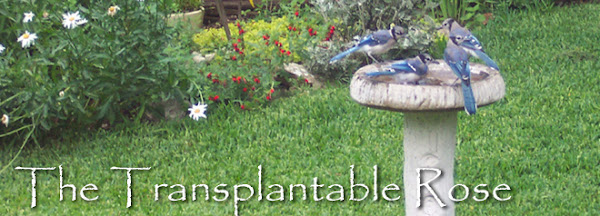At
the end of year 6 of the Transplantable Rose blog, what better way to start
year 7 than with tomatoes? We like peppers and tomatoes. We like growing them
and we like eating them. I even wrote lyrics about the end of Tomato season for
a music video called Farewell, Tomato.
After
Philo made our small vegetable plot in 2004 we tried different ways to support
& protect the plants.
For
a few years we just staked them
Our
next phase lasted a few years - a large, strong, painted wooden framework that
could support plants, bird netting & shade cloth. We hoped the net could
slow down attacks by squirrels & birds.
It’s
been fun trying new varieties every year, cramming in 9 or 10 tomato plants and
7 or 8 peppers, watering them by hand while knocking leaf-footed stink bugs
into soapy water every day, with the reward of some salad tomatoes and frying
peppers.
A
post on GardenWeb suggested tying net gift bags over the tomatoes to protect
them from the stinkbugs. I was too cheap to buy more than 2 – a good thing
since the squirrels chewed off the whole tomato stem & ran away with the
bags.
On
Tom Spencer’s radio program we heard him mention one gardener who painted
wooden balls red & hung them in the garden while the tomatoes were green.
The idea was that any critter attacking the fake tomatoes would be convinced
that hard, bad tomatoes grew in that garden. We tried it and saw no effect, but
at least they’re decorative!
Recent
years broke the weather rules and what worked before no longer held up. Last summer after every pepper plant in the
vegetable garden died, I found a few new plants at a local nursery, put them into containers and those
survived. The bird netting kept the birds from taking the tomatoes, but it
allowed them to poke their beaks through the spaces to puncture the tomatoes.
The
tomato frame filled the entire center of our little plot, making it difficult
to get in to weed, prune & tie the plants and even harder to reach the
stinkbugs. The stakes & frames gave the birds a good place to perch while
they attacked the fruit. But we gardeners had no place to perch - the seat made
from a slice of tree trunk had rotted.
So
we tweaked the vegetable plot, moving the compost enclosure and changing the
layout. A central path looks better and gives us better access. There are fewer
plants this year. Five pepper plants grow in containers and we’re getting a
small, steady supply. We bought only 5 tomato plants and we’re getting a few of
those each day, too.
The
tomato vines are sort of draped over wire cages to hold the fruit off the
ground but they’re not staked. In place of the garden netting I bought a few
yards of inexpensive nylon net to sort of pouf over the top, using recycled bricks to keep it from blowing away. With a tighter weave and no convenient
sticks for birdie feet to grasp, they have to work harder to punch holes in the
tomatoes.
They
can still do it… our Blue Jays boldly cling to the kitchen windows and tap on
the panes! The squirrels will chew through anything and possums and raccoons
lurk at night. We know we can’t beat any of them but we're trying to stay in the
game.
If
a stinkbug lands on the outside of the net it can’t fit through the small mesh.
If the little monster is already inside clinging to the net I use the net to
enfold & squish it.
A
central path now leads to the concrete bench, relocated from the Secret Garden
to the Vegetable Patch. Last June we turned two old compost bins upside down,
painted them, added handles and called them tomato guards. This June they cover
two tubs bought at some long ago garage sale, painted white. The tub on one
side of the path has a pepper plant and a ‘San Marzano’ tomato grows on the
opposite side. There’s something going on here but it doesn’t fit the usual
categories… it’s not Potager and it’s not Austintatious and it’s not Garden
Junk. Maybe it’s Transplanted Frugal Midwesterner?
Two
of the tomatoes were supposed to be our favorite ‘Black Krim’. At planting time
I noticed a ‘Better Boy’ tag down the side of the pot. And that one ‘Black
Krim’ has now turned to None. Look at these tomatoes! They all came from the
same mislabled plant – not ‘Black Krim’ but it might take a tomato-genealogist
to figure out what they are.




















